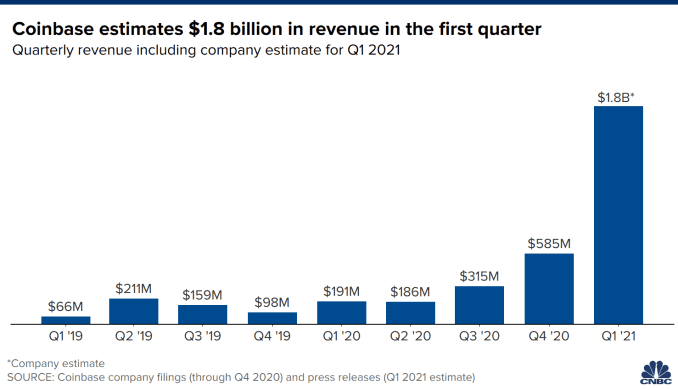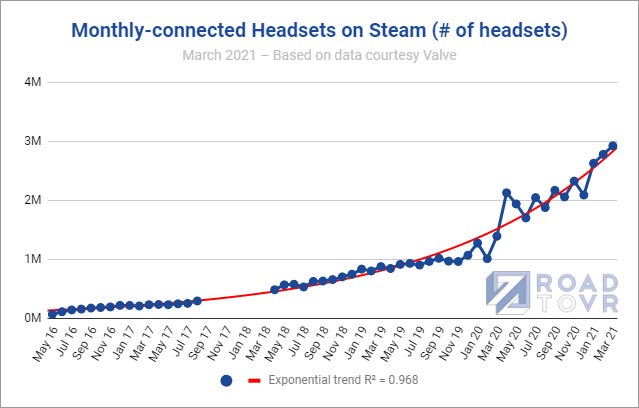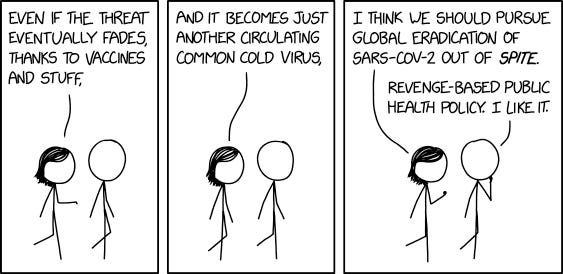Greetings!
Here’s your weekly wrap of the latest technology, innovation, and finance news.
? Biology
Researchers have developed a new “reversible” CRISPR technique, CRISPRoff, that allows them to turn genes on and off (see the paper).
The technique, described in a paper published in Cell on April 9, is reversible unlike traditional CRISPR, and the introduced changes can even be passed down to future lines of cells. This nondestructive gene-editing protein acts as a simple off switch for genes, recreating the benefits of the widely used CRISPR-Cas9 system without damaging cells’ genetic material.
Researchers from the University of London have shown that animal DNA can be collected from air samples in a proof-of-concept study (see the paper and the 4-minute video abstract).
“We were interested in whether we could use this ‘airDNA’ as a way to assess what species were present in a burrow or a cave where we could not easily see or capture them,” she added.
Human-like intelligence in animals is far more common than we thought, writes David Robson in New Scientist.
Elon Musk’s brain-computer interface company, Neuralink, showcased a monkey playing Pong with its mind (see the 3-minute video).
Pager, a 9-year-old macaque monkey, had a Neuralink implanted about six weeks before the video was shot, the video’s unnamed narrator says.
A new paper explains the future ethical implications associated with lab-grown brains(see the paper).
While growing whole human brains inside animals is not under any serious consideration, transplanting brain organoids could give crucial insight on how diseases like dementia or schizophrenia form and treatments to cure them.
The New York Times wrote a wonderful profile of superstar scientist Dr Katalin Kariko. Dr Kariko languished in academic obscurity for decades while working on the mRNA delivery technology foundational to the Pfizer/BioNTech and Moderna COVID-19 vaccines. A great read.
“We talked to pharmaceutical companies and venture capitalists. No one cared,” Dr. Weissman said. “We were screaming a lot, but no one would listen.”
Dr Kariko also featured heavily in this Bloomberg Quicktake video on how mRNA therapies could soon fight cancer (12 minutes).
? Blockchain and Crypto
Coinbase estimates Q1 revenue increased 9x to $1.8 billion from one year ago, and net income was between $730 million and $800 million, up from $32 million a year ago. Coinbase plans to go public this Wednesday via a direct listing that could see the company valued at more than $100 billion.
 Bitcoin exchange Kraken also saw record trading volumes in the first quarter and is considering going public in 2022.
Bitcoin exchange Kraken also saw record trading volumes in the first quarter and is considering going public in 2022.
Kraken saw four times as many new users sign up to its platform in the first quarter of this year than it did in the second half of 2020. Spot trading volumes in the first quarter were 1.5 times higher than in all of last year, reaching a record level of $160 billion.
The Eastern Caribbean became the first currency union to issue blockchain-based digital currency.
The system allows users even without bank accounts – but with a smartphone – to use a downloaded app and make payments via a QR code. Those without bank accounts would go to a previously approved agent or nonbanking financial institution who would verify a person’s information and then approve a DCash wallet.
Akon, the Senegalese-American singer, wants to run a Senegal city on a cryptocurrency called Akoin.
Akon is hoping the alternative models proposed by Akon City will help Senegal, a country dealing with mass protests in the wake of an economic crisis, tackle poverty and youth unemployment. Construction on the project is expected to start this year, and is expected to cost around $6 billion, pooled between Akon and outside investors. The singer this week also announced plans to build a “sister” Akon City in Uganda.
? Health
Newsweek looked at whether blood from young people can slow aging.
The results were exhilarating. They suggested that stem cells could be revitalized simply by reintroducing back into the blood stream the molecules, present in young blood, that could turn them on. The next step was finding the specific youth-promoting factors in the blood responsible for the change. But that would not be easy.
Researchers have developed a blood test for depression and bipolar disorder (see the paper).
? Finance
Investors have been borrowing heavily to buy stocks over the past year.
As of late February, investors had borrowed a record $814 billion against their portfolios, according to data from the Financial Industry Regulatory Authority, Wall Street’s self-regulatory arm. That was up 49% from one year earlier, the fastest annual increase since 2007, during the frothy period before the 2008 financial crisis. Before that, the last time investor borrowings had grown so rapidly was during the dot-com bubble in 1999.
Aussie tech superstar Canva raised US$71 million at a US$15 billion valuation.
The capital comes from new investors including T. Rowe Price Global Technology Fund and Dragoneer Investment Group, as well as repeat backers such as Blackbird and Skip Capital.
The fresh funding and new valuation also comes off the back of a year of strong growth for the Aussie unicorn, which has seen a 130% increase in revenue, year-on-year.
OneStream, a corporate performance management (CPM) company, has raised $200 million at a valuation of $6 billion.
Sendbird has raised $100 million at a $1.05 billion valuation. The Korean API company helps others build text and video interactivity into their apps and services.
CNBC looked at whether robots will replace human financial advisors (11-minute video).
Today roboadvisors manage $460 billion, an increase of 30% compared to 2019, and the industry is expected to expand even further, with some analysts predicting it will become a $1.2 trillion industry by 2024.
? Virtual and Augmented Reality
Facebook, Apple, Niantic, and Snap are betting that people are ready for augmented reality glasses.
The AR push reflects a belief among many technologists that face-borne computers could be a transformational class of products, enabling people to look up directions on a map, scroll through text messages or call up a recipe right before their eyes—and without losing sight of the real world. Tech companies see AR glasses as an opportunity to drive consumers to spend more time in their ecosystems, where they can show ads, sell products and pursue other moneymaking opportunities.
The number of VR headsets used on gaming platform Steam was up 110% to 2.9 million in March.

? Working from Home
A new survey by Robert Half finds that 34% of work-from-home workers say they’d rather quit than return to full-time office work.
The New York Times wrote about the shrinking need for office space.
Jamie Dimon, chief executive of JPMorgan Chase, the largest private-sector employer in New York City, wrote in a letter to shareholders this week that remote work would “significantly reduce our need for real estate.” For every 100 employees, he said, his bank “may need seats for only 60 on average.”
? Renewables
Bitcoin mining emissions in China will hit 130 million tonnes by 2024, enough to threaten the country’s climate change targets, according to new research from researchers from the University of the Chinese Academy of Sciences, Tsinghua University, Cornell University, and the University of Surrey (see the paper).
Researchers at Shinshu University have developed a two-step method that’s 100x more efficient at generating hydrogen from photocatalytic reactions (see the paper).
Still, despite the 100-fold efficiency jump, BaTaO2N isn’t quite ready for prime-time hydrogen production.
“We still need a similar jump in improvement of the efficiency to make this technology practically useful,” Hisatomi said
? Batteries
Chemists at St Petersburg University have developed a new type of battery that can charge 10x faster than lithium-ion batteries (see the paper).
‘A battery manufactured using our polymer will charge in seconds – about ten times faster than a traditional lithium-ion battery. This has already been demonstrated through a series of experiments. However, at this stage, it is still lagging behind in terms of capacity – 30 to 40% lower than in lithium-ion batteries. We are currently working to improve this indicator while maintaining the charge-discharge rate,’ says Oleg Levin.
CNBC looked at how JB Straubel, the co-founder and ex-CTO of Tesla, is now tackling the battery recycling problem with an inside look at his startup Redwood Materials(18-minute video).
Redwood’s techniques recover 95% of a battery’s nickel, cobalt, aluminium, graphite, and more than 80% of a battery’s lithium.
? Artificial Intelligence
Amazon Web Services (AWS) launched Amazon Lookout for Equipment, a predictive maintenance service that uses machine learning and customer sensor data to predict when a machine will break down or start running suboptimally.
A US Government audit looking for algorithmic bias in an AI service provided by a company with ties to white supremacy found no AI.
? Chips and Computing
Quartz profiled ASML, “the company that modern capitalism couldn’t survive long without”.
Which makes it all the more remarkable that a single Dutch company sits at the very heart of this $439 billion industry. At its headquarters in Veldhoven, in the Netherlands, ASML assembles photolithography machines, which etch circuit patterns onto chip wafers using low-wavelength light. Other companies make such machines too, but ASML controls more than 60% of the market; in 2019, its revenue was 11.8 billion euros ($13.2 billion). It is also the only manufacturer of the latest, most precise generation of chip-making machines, which uses extreme ultraviolet light (EUV), with a wavelength of 13.5 nanometers—a ten-thousandth the width of a human hair.
Want to understand what a CPU is? Intel posted two helpful videos that explain the basics of modern CPU architectures (19 minutes and 25 minutes).
A February 2021 report by Dutch environmental consultancy CE Delft suggests cultivated meat could be cheaper than conventional beef by 2030.
A pair of robot legs has been taught to walk using reinforcement learning (see the paper).
Researchers at RMIT in Australia have found a way to make drones less noisy when they fly without losing thrust (see the paper).
Procter & Gamble worked with a China trade group to try to bypass Apple’s new privacy tools.
The move is part of a broader effort by the consumer-goods giant to prepare for an era in which new rules and consumer preferences limit the amount of data available to marketers. P&G —among the world’s largest advertisers, with brands such as Gillette razors and Charmin toilet paper—is the biggest Western company involved in the effort, the people said.
xkcd on eradication:
 According to the Pew Research Center, YouTube usage grew from 73% of US adults in 2019 to 81% of US adults in 2021, making it the social media app with the greatest growth during the pandemic. Reddit came in second with usage growing from 11% of US adults in 2019 to 18% in 2021.San Francisco startup Embark has partnered with AB InBev, Warner Enterprises, and others to test their autonomous truck driving technology.Have a great week,Thomas
According to the Pew Research Center, YouTube usage grew from 73% of US adults in 2019 to 81% of US adults in 2021, making it the social media app with the greatest growth during the pandemic. Reddit came in second with usage growing from 11% of US adults in 2019 to 18% in 2021.San Francisco startup Embark has partnered with AB InBev, Warner Enterprises, and others to test their autonomous truck driving technology.Have a great week,Thomas



